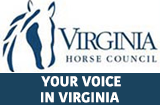ADDITIONAL CASES OF EASTERN EQUINE ENCEPHALITIS IN VIRGINIA ANIMALS
Phone:
Date Added: 8/14/2009
The Virginia Department of Agriculture and Consumer Services (VDACS) has confirmed two more positive cases of Eastern Equine Encephalitis (EEE) in horses for 2009. The latest cases came from Chesapeake and Suffolk. This brings the total EEE cases this year to four horses, two in Chesapeake and two in Suffolk, a suspected goat in Chesapeake, with test results still pending on an emu from Chesapeake.
The latest equine cases include a two-year-old draft cross stallion from Suffolk and a seven-year-old Tennessee Walking Horse mare from Chesapeake. The Suffolk horse had not been vaccinated for EEE, and the Chesapeake horse had not been vaccinated in six years. Both horses were euthanized because of the severity of their symptoms - elevated temperature, incoordination, lateral recumbency, and inability to swallow.
“EEE is a serious condition,” explained Dr. Richard Wilkes, State Veterinarian, “and unlike West Nile Virus, few horses survive the disease. There is no cure, but there are effective vaccines. So far this year, all of the positive EEE horses had not been vaccinated or hadn’t been vaccinated recently for the disease. With a rainy spring and summer and an increase in the mosquito population, I’m not surprised that we’re seeing an increase in the incidents of EEE, but I am disappointed that horse owners in the high risk areas of the state are not vaccinating.”
VDACS encourages horse owners to vaccinate their horses every six to twelve months against EEE. This is particularly important in the Southeastern region of Virginia, where many veterinarians recommend the six-month vaccination interval. Vaccination includes an initial shot, with a booster six weeks later, then boosters every six to twelve months. Vaccinations must be administered correctly and in a timely fashion to be effective. There is no vaccine for goats or emus.
Generally, EEE is transmitted by mosquitoes. Prevention methods besides vaccination that help to protect all species include destroying standing water breeding sites for mosquitoes, use of insect repellents such as DEET, and removing animals from mosquito-infested areas during peak biting times, usually dusk to dawn.
For more information on EEE in animals, consumers should contact the Office of the State Veterinarian at 804.692.0601 or consult their local veterinarians.
Elaine J. Lidholm
Director, Office of Communication
Va. Dept. of Agriculture & Consumer Services
Oliver W. Hill Building
102 Governor Street
Richmond, VA 23219
804/786-7686
|



